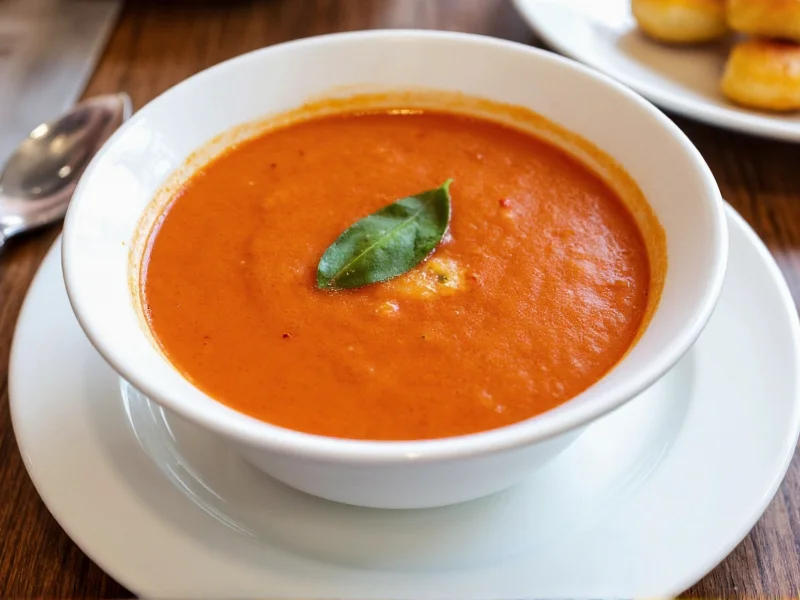Tomato and basil soup represents one of the most harmonious pairings in culinary tradition. This timeless combination traces its roots to Mediterranean cuisine, where both ingredients grow abundantly during summer months. The natural chemistry between acidic tomatoes and aromatic basil creates a flavor profile greater than the sum of its parts.
Essential Ingredients and Their Roles
Creating an exceptional tomato & basil soup requires understanding each component's contribution:
| Ingredient | Function | Quality Indicator |
|---|---|---|
| Ripe tomatoes | Acidic base with natural sweetness | Bright red color, slightly soft to touch |
| Fresh basil | Herbal counterpoint to acidity | Vibrant green, fragrant when crushed |
| Garlic | Depth and complexity | Firm cloves, no sprouting |
| Good olive oil | Flavor carrier and richness | Grassy aroma, golden-green color |
Step-by-Step Preparation Guide
Follow this method for restaurant-quality tomato & basil soup at home:
- Prep ingredients: Core and roughly chop 2 lbs ripe tomatoes. Mince 2 garlic cloves. Tear 1 cup fresh basil leaves.
- Sweat aromatics: Heat 2 tbsp olive oil over medium-low. Cook garlic until fragrant (30 seconds) - don't brown.
- Build flavor foundation: Add tomatoes and a pinch of salt. Cook uncovered 15-20 minutes until tomatoes break down.
- Incorporate basil: Stir in 3/4 of basil leaves during last 5 minutes of cooking to preserve freshness.
- Blend smoothly: Use immersion blender directly in pot for safest results. Alternatively, cool slightly before using countertop blender.
- Final seasoning: Adjust salt, add black pepper, and swirl in remaining fresh basil just before serving.
Avoiding Common Tomato Soup Mistakes
Many homemade tomato & basil soup recipes fail due to these preventable issues:
- Using unripe tomatoes: Underripe tomatoes lack natural sweetness, requiring excessive sugar that alters authentic flavor
- Overcooking basil: Adding basil too early destroys its delicate volatile oils - add during final minutes
- Skipping acid balance: A splash of balsamic vinegar (1/2 tsp) enhances tomato flavor without making soup taste vinegary
- Blending while boiling: Hot soup expands dramatically when blended - always cool slightly first
Historical Evolution of Tomato & Basil Soup
The pairing of tomatoes and basil, now iconic in Mediterranean cuisine, has a surprisingly recent history. While both ingredients have ancient roots, their combination in soup form evolved through distinct phases:
| Time Period | Development | Historical Evidence |
|---|---|---|
| 16th Century | Tomatoes introduced to Europe from the Americas; initially grown as ornamental plants due to fears of toxicity | USDA National Agricultural Library documents early European skepticism (Source) |
| 18th Century | Tomatoes gradually accepted as food in Mediterranean regions; basil remained a staple herb | Italian culinary manuscripts from the period reference tomato-based sauces but not soup combinations |
| 1897 | First commercially canned tomato soup released by Campbell Soup Company, establishing tomato soup as an American staple | Smithsonian National Museum of American History archives (Source) |
| Mid-20th Century | Tomato and basil pairing popularized globally through Italian cuisine exports; soup variations emerge in European cookbooks | 1950s Italian cookbooks like "Il Cucchiaio d'Argento" first document tomato-basil soup recipes |
Variations for Different Dietary Needs
Adapt this classic tomato & basil soup recipe for various preferences:
Creamy Version Without Dairy
For a rich texture without cream, blend in 1/4 cup cooked white beans or 1/2 ripe avocado. These additions create velvety texture while boosting nutritional value - perfect for vegan tomato basil soup enthusiasts.
Spicy Arrabbiata-Inspired
Add 1/4 tsp red pepper flakes with the garlic for a subtle kick. This spicy tomato basil soup variation pays homage to Italian arrabbiata sauce while maintaining soup-friendly heat levels.
Summer Garden Version
Incorporate 1/2 cup fresh zucchini and yellow squash during the last 10 minutes of cooking. This garden fresh tomato basil soup maximizes seasonal produce while adding vegetable nutrition.
Contextual Guidelines for Recipe Adaptation
Understanding the limitations of substitutions ensures your tomato & basil soup maintains its authentic character. These evidence-based boundaries prevent common adaptation failures:
| Variation Attempted | Effective Context | Critical Limitation |
|---|---|---|
| Using dried basil instead of fresh | Long-simmered soups (3+ hours) where dried herbs have time to rehydrate | Use only 1/3 the quantity; ineffective in quick-prep versions due to inability to rehydrate (University of Minnesota Extension) |
| Substituting canned tomatoes for fresh | Off-season cooking when fresh tomatoes are unavailable | Requires 15% less liquid; add sugar only if tomatoes taste overly acidic (USDA NCHFP) |
| Dairy-free cream alternatives | Vegan diets or lactose intolerance | Avocado oxidizes quickly; add after blending and consume immediately (Cornell Food Preservation) |
Serving Suggestions That Elevate Your Soup
Transform your tomato & basil soup from simple to spectacular with these finishing touches:
- Texture contrast: Top with homemade croutons or toasted pine nuts
- Flavor accents: Drizzle with high-quality olive oil or pesto swirl
- Protein boost: Add white beans or chickpeas for heartier tomato basil soup with protein
- Perfect pairing: Serve with crusty bread for dipping or alongside a simple green salad
Storage and Reheating Best Practices
Proper storage maintains flavor and safety for your homemade tomato & basil soup:
- Cool completely before refrigerating (within 2 hours of cooking)
- Store in airtight container for up to 4 days
- Freeze in portion-sized containers for up to 3 months
- Reheat gently over medium-low heat - avoid boiling which diminishes fresh basil flavor
- Stir in fresh basil after reheating for maximum aroma
Nutritional Benefits of Tomato & Basil Soup
This classic combination offers impressive health benefits beyond its delicious taste. Tomatoes provide lycopene, a powerful antioxidant that becomes more bioavailable when cooked. Basil contributes vitamin K and anti-inflammatory compounds. When prepared without heavy cream, a bowl of healthy tomato basil soup delivers approximately:
- 150-200 calories per serving
- 3-5g fiber from whole tomatoes
- Significant vitamin C and potassium
- Natural antioxidants from both primary ingredients











 浙公网安备
33010002000092号
浙公网安备
33010002000092号 浙B2-20120091-4
浙B2-20120091-4